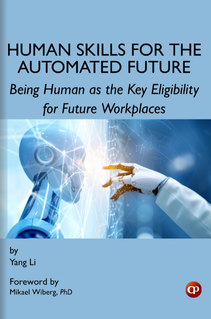Foreword: Human Skills for the Automated Future: Being Human as the Key Eligibility for Future Workplaces

by Mikael Wiberg
Professor, Department of Informatics, Umeå University, Sweden.
10.46679/978819678058600
This chapter is a part of: Human Skills for the Automated Future: Being Human as the Key Eligibility for Future Workplaces by Yang Li
ISBN (Ebook):978-81-967805-8-6
ISBN (Softcover Print):978-93-49926-23-3
© CSMFL Publications & its authors.
Published: May 15, 2025
Introduction
At a time when artificial intelligence (AI) is reshaping the very fabric of work and society, one question stands at the forefront: – What does it mean to be human in an automated future? As organizations and individuals seek to grasp and tackle the increasing influence of AI, it becomes clear that our unique human capabilities will define our role and place in this evolving landscape of AI-driven digital services. Yang Li’s Human Skills for the Automated Future offers a timely and essential exploration of the value of human skills in a world increasingly shaped by this technology. As we move deeper into the current wave of AI and automation, it is easy to succumb to the notion that AI will eventually surpass humans in all professional capacities. However, while AI excels at processing vast amounts of data, executing repetitive tasks with precision, and augmenting efficiency in ways never before imagined, it lacks the essence of human cognition—creativity, critical thinking, emotional intelligence, and interpersonal social skills. These are the skills that should not be replicated by algorithms, and these skills should remain our competitive advantage in the future of work and social interaction.
This book begins by contextualizing the challenge we face today: the rapid obsolescence of traditional skills and the increasing demand for uniquely human competencies. It then takes the reader on an insightful presentation of the fundamentals of AI, demonstrating how it is being integrated into workplaces across organizations. Rather than painting AI as a force of displacement, the book highlights Ais role as a complement to human abilities—one that enhances and augments, rather than replaces, human skills and capabilities.
A key strength of this book lies in its examination of the human skills that remain irreplaceable in the face of technological advancements. Critical thinking, for example, is more crucial than ever in an era where misinformation spreads rapidly, and data-driven decisions require human discernment. Yang Li provides practical strategies to further develop analytical abilities, emphasizing the importance of questioning assumptions, embracing diverse perspectives, and strengthening reasoning skills. Creativity, another uniquely human skill, is explored in depth, with insights into how AI can serve as a tool rather than a threat to innovation. The book underscores the value of fostering environments that encourage original thinking and the development of creative solutions—an ability that will remain central to problem-solving in an AI-powered world. Equally important is the discussion on emotional intelligence and interpersonal skills, which play a central role in leadership, teamwork, and customer relations. As automation takes over transactional tasks, the human elements of empathy, communication, and collaboration become even more indispensable. Organizations that recognize and invest in these skills will not only adapt to the future of work more effectively, but also create more inclusive and adaptive workplaces.
Beyond identifying these critical human competencies, Human Skills for the Automated Future provides actionable strategies to nurture them—both in education and professional settings. The insights offered in this book are particularly relevant for leaders, educators, and policymakers seeking to future-proof their institutions and societies. As AI continues to reshape job roles and economic structures, the ability to cultivate and prioritize human skills will be the defining factor in long-term success and societal well-being.
As someone deeply engaged in the intersection of digital technology, interaction, sustainability, and human capabilities, I am confident that this book will serve as a guide for individuals and organizations who seek to understand and approach the complexities of an AI-driven and automated future. Yang Li masterfully articulates why being human remains our most valuable asset in the digital age. This book is not just a call to action but a roadmap to ensuring that, amid rapid technological advancements, we do not lose sight of what makes us as humans truly irreplaceable.
The future of work is not one of humans versus machines, not a divide, but a matter of humans and machines working together—where our distinctly human skills work in concert with the technologies of our nowadays AI-driven world.
Keywords: Human skills, Critical thinking, Future workplace, AI
This book is available worldwide via EBSCOhost Academic Collection, EBSCO E- books, Google Play Books, Amazon, World Cat Discovery Service/OCLC, CSMFL Bookstore, and 200+ book resellers and academic content vendors.
Statement on Publication Ethics
We, at CSMFL Publications, are committed to ensure the unbiased and transparent publishing, and upholding the high standards of editorial integrity in our publications. To know more, please read our Statement on Publication Ethics, Editorial Integrity & Misconduct